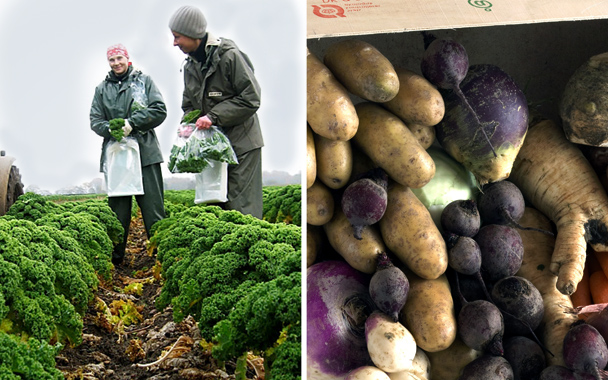Joining a farm share is a kind of religion for some foodies. And like any true faith, it requires sacrifices. Instead of shopping at a 24-hour grocery store, members of a CSA (community-supported agriculture) program show up at a designated time and place to pick up their weekly box. Inside is an assortment of fruits and vegetables that they may not like or even know what to do with. Some members complain. But for most, the suffering (if you can call it that) is viewed as a step on the path to righteousness.
Danish gastropreneur Thomas Harttung is an evangelist of a different path. His company, Aarstiderne, delivers weekly boxes of fruit, vegetables, meat, fish, and bread to the doors of 45,000 families in Denmark and 5,000 in Sweden. About 70 percent of the food comes from within Denmark; half of that was grown on Harttung’s own farm, Barritskov, outside of Copenhagen. Now ten years old, the company is the largest CSA in the world with annual revenues of $45 million and is growing at a 20 percent clip—not bad in the midst of an economic crisis. “To be successful, we had to give up some of the high-church ethics of a CSA and adopt a more ecumenical approach,” says Harttung. “But to really change things, we cannot preach to a very small congregation. We must deliver a message about organic food to a broader audience.”
Here’s how it works: Customers choose from 15 vegetable boxes, 10 fruit boxes, and 10 fish and meat offerings, all of which are delivered weekly year-round. Unlike a traditional CSA, Aarstiderne allows customers to change their orders weekly or suspend their subscriptions when they go on vacation, just as they can with a newspaper. In late fall, Aarstiderne’s $35 “basic box,” which feeds a family of two adults and two children for a week, includes potatoes, carrots, baby leaf lettuce, tomatoes, cucumbers, red onions, kale, runner beans, and salsify. The “boring box” has all that, minus the “fancy” vegetables like kale and salsify, which might not appeal to more conservative palates. There’s also a “dogma” box—named for Denmark’s well-known Dogme film collective, which banned artificial lighting and sound—that contains only Danish produce. In the winter, that means a lot of roots, tubers, and greenhouse lettuce. But Harttung says the dogma box, which accounts for between five and 10 percent of Aarstiderne’s orders, keeps the company on its toes by pushing it to discover the limits of what is possible to grow locally.
Harttung attributes Aarstiderne’s success to the delicate balance it strikes between aspirational and dogmatic. (He’s a big fan of religious metaphors.) For example, the company has a no-fly rule: All imported produce, including Spanish oranges and Costa Rican bananas, must arrive by more environmentally responsible boat or truck. And customers cannot pick and choose what they want on a given week. This limits Aarstiderne’s waste to just two to three percent of its produce, compared to the 12 percent that is wasted in conventional European retail chains. (Despite environmental concerns, Aarstiderne does wash all its produce on the farm: It wastes more water than if customers washed it at home and shortens the shelf life of fruits and vegetables, but it makes cooking easier for busy families with limited time.)
Harttung didn’t set out to reform the CSA model. In 1997, he planned to grow seasonal, organic food to his family and 100 others nearby. But the project quickly grew and its success has fueled a kind of environmental crusade. Harttung believes that farms, which are responsible for 8.2 percent of greenhouse gases, can be part of the solution to global warming. As part of The GreenCarbon Initiative, Harttung’s goal is to offset 100% of the business’s emissions. To that end, the farm is adding new hedgerows and changing the management practices of the property’s forests, wetlands, and grasslands.
Aarstiderne dwarfs other CSAs and delivery services. But like Harttung, many smaller CSAs are beginning to realize that the best way to support organic, local agriculture is to make it as easy as to buy as conventionally produced food. Here in the customer-service obsessed United States, that means offering more choice. The nation’s largest organic delivery service, Spud, lets customers choose from a variety of local fruits, vegetables, and dry goods for weekly, bi-monthly, or one-off deliveries. Boston Organics, which serves 2,000 families in northeast, lets customers change their boxes from week to week. “If we had stuck with the CSA model that Aarstiderne is doing, we could capture maybe one quarter of one percent of households,” says David Van Seters, Spud’s president and CEO. “But to go beyond the hardcore customer, the one who so much wants to buy local and organic that they’re willing to get stuff they don’t want, we had to offer more convenience.” In the past year, the company has doubled in size to 16,000 customers and expanded from four locations to seven across the West Coast, including Seattle, Portland, San Francisco, and Los Angeles.
The models may vary from place to place. But the lesson is clear: The most successful religions are ones that make it easy to remain faithful.



 Pinterest
Pinterest


